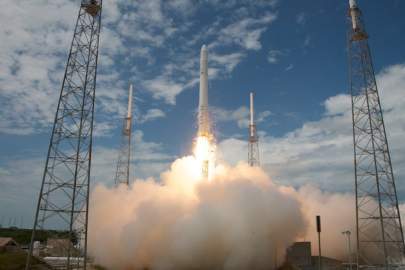Space Tourism - To low Earth orbit and beyond!
By Scott Tilley, ASCF Senior Fellow
June 23, 2022

In 2019, I published a book called “SPACE: Celebrating 50 Years Since We Landed on the Moon.” I was honored to have the book’s foreword penned by Winston Scott, a well-known local astronaut from the Space Shuttle era. As the title suggests, I wrote the book to mark a special milestone in human history: July 20, 1969, the day Neil Armstrong and Buzz Aldrin became the first men to walk on the Moon.
Rocket launches occur almost daily for those of us fortunate enough to live here on the Space Coast. When I first arrived in Florida, I was surprised to see local beachside hotels move their sandwich boards out every morning with three essential bits of information chalked on the front: the air temperature and weather forecast, the ocean’s temperature and rip current warnings, and the time and date of the next launch. Where else could you be so inspired at breakfast?
But as much as launches may have become normalized in this unique part of the world, the sight and sounds of the mighty Saturn V rocket lifting the Apollo 11 crew into space at 9:32 a.m. on July 16, 1969, from the Kennedy Space Center (KSC) Launch Complex 39A was truly remarkable. The whole world watched the event, connected in wonder at what NASA and the United States, working in concert with our aerospace and defense contractors, had accomplished in such a short period of time. It was a powerful display of technical power that literally shook the world.
***
Fast forward almost five decades, and commercial spaceflight is in full swing. On February 6, 2018, SpaceX made history with the first launch of their Falcon Heavy rocket – and from the same storied pad 39A at KSC as Apollo 11. The launch was spectacular, but even more astonishing was the autonomous landing of the twin side boosters at Landing Zones 1 and 2 at Cape Canaveral Air Force Station near KSC. When I watched it, I felt like it was a scene from “War of the Worlds,” where the Martians are invading Earth.
This inaugural flight of the Falcon Heavy made history for two other reasons. Firstly, the rocket launched a Tesla car into space! Remember that Elon Musk is the CEO of both SpaceX and Tesla. The rocket carrying the Tesla boosted the vehicle towards a Mars orbit. Sadly, a minor navigational error caused the car to veer towards the asteroid belt. However, it wasn’t too much of a loss: the radiation in space would have cooked the car anyway.
The other reason the launch of the Falcon Heavy made history was the driver of the Tesla: it was a mannequin called Starman. He was wearing a prototype SpaceX spacesuit for the ride. The whole ride was a publicity gimmick, but it worked. It caught the attention of media around the world. Arguably, it also marked the start of space tourism.
***
According to Wikipedia, “Space tourism is human space travel for recreational purposes.” Numerous companies are getting into space tourism, but only three have sent non-astronauts into space: Blue Origin, SpaceX, and Virgin Galactic. These companies see a profitable future in transporting regular citizens to space, but for now, hitching a ride remains an extremely costly endeavor. For example, three private citizens booked a ride to the International Space Station on a SpaceX rocket in April 2022 and paid $55 million for the trip. Each.
Space tourism represents the “next big thing” for the national space program and deserves our support. What began as a national public effort in the 1950s and 1960s gradually morphed into an international commercial industry in the 2000s and 2010s. Now in the 2020s, we’re moving into private space flight. It is essential that the United States maintains a lead in this area, as it represents a strategic venture that will have repercussions on our national security.
Space tourism does not obviate the need for NASA-led missions. Government organizations like NASA or the European Space Agency (ESA) are still essential to the grand design to explore our solar system and beyond. For example, NASA’s gigantic Space Launch System (SLS) rocket will provide the transportation for the Artemis lunar program. The SLS is larger and more powerful than the original Saturn V rocket. I hope it will inspire the next generation of astronauts, engineers, and scientists when it launches.
***
Eugene Cernan was the last man to walk on the Moon. He was part of the Apollo 17 mission in 1972. As far as we know, no one has visited since. The democratization of orbital travel is underway, and considering 2022 is the 60th anniversary of KSC, the timing couldn’t be better. So, save your pennies, and maybe one day, you can join Captain Kirk in space. Ad Astra Per Aspera!
###




